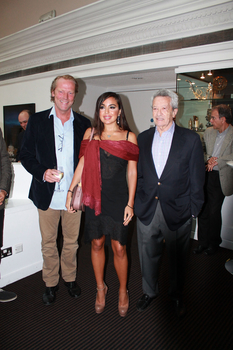London screens documentary on Khojaly tragedy

By Sara Rajabova
London hosted a premiere screening of a documentary film about the Khojaly genocide committed by the Armenian armed forces in early 1990s.
Vice-President of the Heydar Aliyev Foundation Leyla Aliyeva attended the London premiere screening of "Endless Corridor" at the British Academy of Film and Television Arts (BAFTA), AzerTag news agency reported.
Narrated by renowned British actor Jeremy Irons, the documentary examines the events surrounding the Khojaly Massacre, when 613 men, women, and children were killed on 25-26 February, 1992.
Afterwards, Leyla Aliyeva, the initiator and driving force behind the Justice for Khojaly campaign, spoke about the importance of raising awareness about the tragedy.
"I am pleased that this film was made. Endless Corridor is a moving documentary recalling the unimaginable horrors of the Khojaly Massacre and shedding light on this awful chapter of Armenia's aggression," she said. "We must never see a repetition of such crimes ever again."
In 1992, the town of Khojaly, the second largest town in the Nagorno-Karabakh region of Azerbaijan, came under intense fire from the towns of Khankendi and Askeran which had been already occupied by the Armenian armed forces.
During the massacre, 613 civilians -mostly women and children- were killed, and a total of 1,000 people were disabled. Eight families were exterminated, 25 children lost both parents, and 130 children lost one parent.
Moreover, 1,275 innocent people were taken hostage, and the fate of 150 of them remains unknown. Civilians were shot at close range, scalped, and burned alive. Some had their eyes gouged out and others were beheaded.
Aleksandras A. Brokas, the documentary's Lithuanian Producer/Director, and Gerald Rafshoon, the U.S. Co-Producer, also attended the screening together with international television executives and prominent actors such as Anne Archer, BAFTA winner from Fatal Attraction and the Harrison Ford Jack Ryan films, and Iain Glen, one of the stars of the popular TV series Game of Thrones.
Brokas, who worked on the documentary for nearly five years, noted that he had worked with movie professionals from 15 countries in order to provide an independent view of the situation in the region.
"The path to freedom and independence is very similar in all post-Soviet countries - it costs a lot. The Khojaly tragedy tells us how cynical and inhuman people decided the fate of others," Brokas said.
Meanwhile, Rafshoon, White House Communications Director under the Jimmy Carter administration and the producer of the current successful play Camp David in Washington, pointed out that despite international efforts, the Nagorno-Karabakh conflict continues to remain unresolved.
The Nagorno-Karabakh conflict emerged in 1988 when Armenia made territorial claims against Azerbaijan. Since a lengthy war in the early 1990s that displaced over one million Azerbaijanis, the Armenian armed forces have occupied over 20 percent of Azerbaijan's internationally recognized territory, including Nagorno-Karabakh and seven adjacent regions.
"I hope this film will re-focus attentions on this besieged region that has been ravaged for more than two decades," Rafshoon said.
The film follows Lithuanian journalist Ricardas Lapaitis on a trip back to Azerbaijan 20 years after he covered the Nagorno-Karabakh conflict and Khojaly Massacre as a war correspondent. This is a story that has haunted him ever since, he says.
The documentary shows him reuniting with the survivors of the tragedy who recall the heart-rending stories of their escape from the Armenian bombardment, losing many loved ones along an Endless Corridor to safety.
It also hears from the perpetrators of the massacre, the Armenian commanders who examine their war strategies and reasoning.
Despite several resolutions by the United Nations and other international bodies calling for its unconditional withdrawal, Armenia has continued to occupy Nagorno-Karabakh and seven surrounding districts to this day.
The completed film is being screened and distributed by international broadcasters now.
